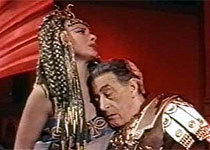Textuality » 4A Interacting
The tragedy starts with a comment made by Philo (Antony's friend) about Antony's love story with Cleopatra, the queen of Egypt. Philo says that this love story overflows the measure, it means that now Antony, totally madly in love, thinks too much on Cleopatra and not on his ‘role'(he is a component of the Roman triumvirate). These are the reasons why Philo doesn't like Cleopatra, and he describes her like a stupid woman: upon a tawny front, that is a synecdoche: her forehead alludes to the brain, so it's a demolition.
Now he is cooling the lust of a Gypsy(Cleopatra): he is her servant! Cleopatra with her skill of seducer and her beauty fascinated him. Antony prefers to do buckles on his breast than perform his duty. After reading Philo's comment the reader couldn't have a neutral opinion of Cleopatra...
The dialogue is opened with a question that Cleopatra asks to his lover: if it be loved indeed tell me how much, she wants to be reassured, she considers love as quantity (how much) and we understand her power on him from the verb tense she used: the imperative. Antony answers that there are no limits to establish his love. We understand the fact that he is more attracted by the passions when he refuses to hear the attendant that delivers a Caesar's message. Cleopatra (authoritarian figure) wants Antony to hear the attendant: she is manipulating him and she doesn't stand that he is Caesar's laughing. When Cleopatra obliges Antony to hear the messengers he nicknames her wrangling queen, and he sad that he would only hear her ambassadors...
Antony is without personality and courage: he blushes in front of his mistress, in front of Caesar and his wife (Fulvia), for these reasons Cleopatra pulls his legs.
In the second scene of act 2 Domitius Enobarbus describes to Agrippa Cleopatra, he says that she was beautiful like Venus and she set on a pavilion cloth of gold of tissue, that underlines her powerful, her social status. Is told also the first meeting between the Egypt's queen and Antony, in that occasion he invited her to supper but she sad that she wanted him as her guest. Clearly Antony agreed, nobody could resist to the intriguing Egyptian queen,
Caesar had also been trapped by her (She made great Caesar lay his sword to bed:
He plough'd her, and she cropp'd). But Antony must ‘go home' and ‘say good bye' to his mistress that will be difficoult: Cleopatra is so beautiful and graceful and he loves her!

Totò e Cleopatra, 1963